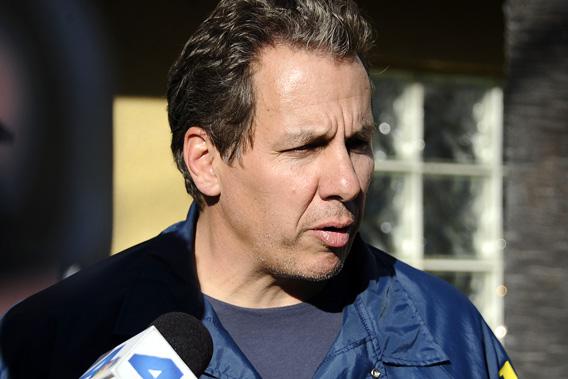Court opens Friday with Internal Revenue Service agent Sandra Lemanski on the stand. Lemanski is there to describe the Whitey Bulger’s money-laundering offenses. Fake payrolls, shady real-estate transactions—it’s nothing we haven’t heard about before. Lemanski’s charts helpfully feature cartoonish sacks of money with dollar signs on them, to give the jury the hint.
The most interesting moment in her testimony comes when we learn that, as an IRS criminal investigator, Lemanski was trained at a federal law-enforcement academy. She received instruction in firearms and defensive tactics. It’s the Tea Party’s worst nightmare: an IRS agent who can physically kick your ass if you refuse to comply with her tyrannical directives.
Once Lemanski’s testimony’s done, we hear from FBI agent Scott Garriola. Garriola runs a fugitive task force based in Los Angeles. He headed up the operation that nabbed Whitey in Santa Monica, Calif., back in 2011.
After getting a babysitter (he was on vacation when the tip regarding Whitey’s whereabouts came in), Garriola surveilled the exterior of the modest apartment Whitey shared with his girlfriend, Catherine Greig. Garriola lured Whitey out by getting the building manager to telephone the couple and tell them their storage locker, in the building’s garage, had been broken into. When Whitey went down alone to check it out, he was confronted by Garriola’s four-person squad.
“He had a white summer-style hat on, and he was dressed in light soft colors,” recalls Garriola. “We asked him to get down on his knees on the ground. He swore at us a few times. He said he wouldn’t get down on his knees because there was grease on the ground. There was an exchange of words.”
Eventually Whitey was handcuffed and subdued. At first he gave an alias. Then he gave up the ghost. “You know who I am,” he said. “I’m Whitey Bulger.” (This is one of the first times we’ve heard Whitey’s nickname in court. He reportedly hates it. Lawyers and witnesses have referred to him as Jim, James, or Mr. Bulger.)
“I asked him if I needed a SWAT team to get Catherine out of the apartment,” says Garriola. “That’s when his tone and demeanor changed.”
Whitey became cooperative. He signed the search consent form as “James J. Bulger,” noting, “This is the first time I’ve signed this name in a long time.” He led agents through the apartment, pointing out piles of guns, knives, and ammunition he’d stashed behind walls. Thirty firearms in total: semi-automatic .45-caliber handguns, .357 Magnums, an AR-15 rifle, a Mossberg 12-gauge shotgun with a pistol grip. Even a dainty .22-caliber Derringer. And more than $800,000 in cash. As a prosecuting attorney lays out this physical evidence on a table—the currency wrapped in clear plastic bags—the courtroom hits the Warren Zevon trifecta: lawyers, guns, and money.
It’s quite an arsenal for a little old octogenarian who was ultimately taken unarmed. Garriola says he asked Whitey if he’d planned to shoot it out in a final stand. “He paused,” remembers Garriola, “and then he said no, because a stray bullet might hit someone.” Not a consideration Whitey gave when he allegedly shot Michael Donahue, a completely innocent bystander who happened to be in the wrong place when Whitey wacked a fellow gangster.
On cross-examination, the defense tries to emphasize that Whitey turned all lambish with the FBI guys because he thought it might spare his girlfriend from harsh judgment. But Catherine Greig got sentenced to eight years in prison anyway. The prosecutor in her case asked to put her away for even longer.
With Garriola done, the government is out of witnesses. It’s been a murderer’s row—quite literally—from 20-time killer John Martorano to sexual abuser and corpse mutilator Stephen Flemmi. But all repulsive, horrific things must come to an end. “At this time,” intones prosecutor Brian Kelly, “the United States will rest its case against James Bulger.”
Next week, the defense begins. It’s looking pretty thin. It appears Whitey will try to show that he wasn’t an FBI informant (good luck with that) and that he committed merely 17 of the 19 murders he’s accused of (sounds like he wants to pin the strangulations of Debra Davis and Deborah Hussey on his cretinous pal Stephen Flemmi). But that’s about it. Might take two days.
That is, unless Whitey testifies. And that’s the question the judge puts to the defense team after the jury has left for the day. “Have you made a decision about whether your client is taking the stand?” she asks lead defense attorney Jay Carney.
Every media member in the courthouse leans forward, ears pricked, fingers crossed. But Carney is coy. He won’t give us his answer until at least Monday, and likely not even then.
The judge comes at it another way. “Regardless, do you think that the jury is likely to get the case at some point next week?” she asks. This is a mildly disingenuous question. If Whitey volunteers to testify, he’ll be up there forever.
“I don’t know the answer,” says Carney.
“I do, your honor,” pipes up prosecutor Kelly, quite cheekily. Kelly seems confident that Whitey won’t dare open his mouth and face the government’s grilling.
Kelly’s baiting Whitey. The prosecutor would love nothing more than to cap off the trial with an epic cross-examination. In fact, I think we’d all like that. But I’m prepared to be disappointed. Whitey always wants to call the shots, and clamming up may be his final power play.
